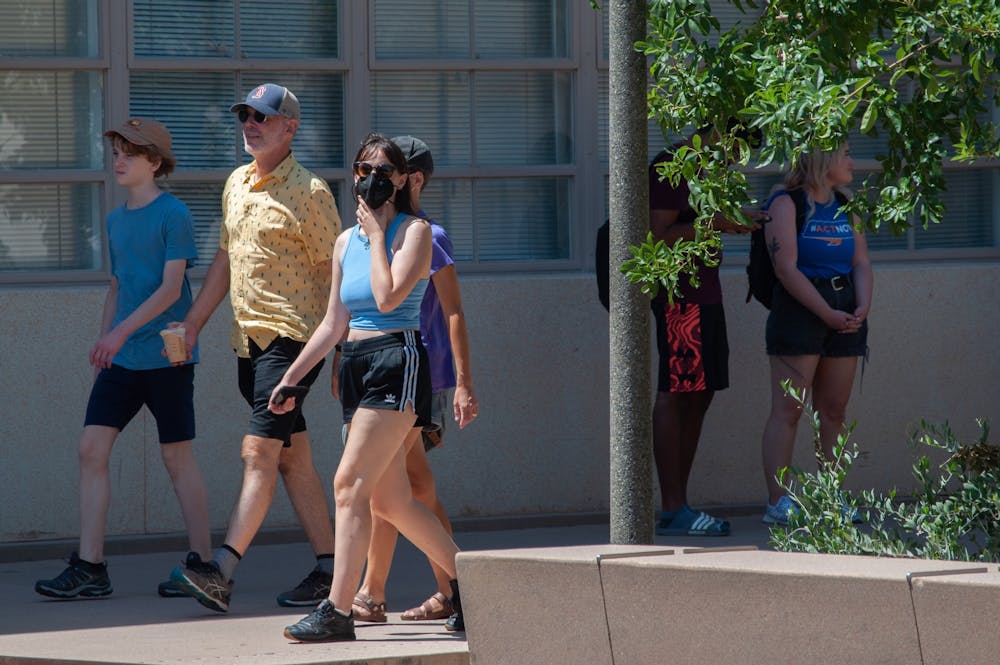ASU's commitment to returning to pre-pandemic operations has not wavered since it first announced fall plans in June — and the University followed through.
Classes began Thursday, and all four campuses were teeming with new and returning faces. Upperclassmen said being back fully in person was as it was before March 2020, now with face masks. Staple welcome events, including Infernofest and Culture Kick-off, returned to their in-person statuses, and students shoulder-to-shoulder celebrated the start of a new school year.
The University welcomed over 77,700 students back to campus, over 3,000 more in-person students than last year. Over 134,500 in-person and online, undergraduate and graduate students began classes on Thursday, breaking previous enrollment numbers for the University.
ASU also broke its record for the highest number of first-year students enrolled in in-person classes — over 14,300 students compared to last year's nearly 13,000 students — a 12% increase. It expects around 16,000 students to be living on all four Phoenix metropolitan campuses.
While this year felt far different from last year's mostly digital beginning, the presence of the Delta variant, a more infectious form of the COVID-19 virus, looms overhead.
"We look forward to welcoming more of our Sun Devils back to campus this fall, but we also will be watching closely and are prepared to pivot as necessary," a University spokesperson said in a statement regarding the spread of the virus.
That "pivot" would likely include mitigation strategies, such as decreasing the occupancy capacity in indoor restaurants or decreasing the number of visitors allowed in dorms, said Joanne Vogel, the vice president of student services. Going back to fully remote instruction would be a last-case scenario, she said, since classrooms are already heavily regulated with mask and social distancing expectations.
"We managed a lot of cases last year, and so it would probably take a large number of cases for us to feel like we couldn't adequately ... provide the level of care we needed to," Vogel said.
With the Delta variant making up a wide majority of COVID-19 cases in Arizona, it is almost certain that transmission of the virus will be seen on campus, said Joshua LaBaer, executive director of the Biodesign Institute.
"What Delta does better than the other variants is it amplifies itself to higher numbers in the bodies of the people that are infected," LaBaer said. "You're already spreading it before you know that you are sick."
ASU reported 95 active cases within its community on Monday in its weekly COVID-19 report, a number that has been steadily climbing over the past four weeks.
Adjusting to new 'normal' on the first day back
For freshmen and sophomores alike, walking into a full 100-person lecture hall was a brand new experience. Instead of staring at a screen watching their professors lecture to a nearly empty classroom or their empty home offices, returning students could learn face to face.
"I forget that I'm in college now and there’s like a professor and just a ton of seats and he’s lecturing," said Jaida Hagen, a sophomore studying nursing. "It was definitely strange to see that."
Morgan Dunn, a junior studying sustainability, said she was surprised at the crowds she saw while walking around campus.
"I haven’t been on campus, like actually taking classes since 2019," Dunn said. "It's just a big shock to come back to this, especially since I always forget how many people actually attend ASU."
While the University is returning to pre-pandemic operations wherever possible, students and faculty recognize the virus still exists and are doing what they can to prepare for any situation.
Students getting COVID-19 is still a possibility, and the quarantine protocol from Spring 2021 is still in place. Instructors should work with students who miss class for quarantine-related reasons, and some classes may record lectures, while others may be available to attend through ASU Sync, according to ASU's COVID-19 FAQ page.
Azita Martin, a graduate student studying sustainability solutions, said her professors were already recording their in-person lectures in case someone needed to miss class.
Martin said she thinks the transition back to normal operations still feels like it is being "taken with caution."
Precautions, vaccines and masks
In order to keep campus a safe place for the upcoming semester, Will Humble, the executive director of the Arizona Public Health Association, had two main recommendations: Get people vaccinated and have unvaccinated students wear a mask in the classroom.
"That’s the number one top-of-the-line thing: Get more people vaccinated," Humble said. "Have lots of places to get vaccinated on campus that are easily accessible … everywhere a student goes, have a table set up."
READ MORE: What you need to know about ASU's Fall 2021 semester
Students can sign up to get vaccinated through their ASU Health Portals. Appointments can be set up Monday through Friday at ASU Health Services.
Currently, consistent with Centers for Disease Control and Prevention guidelines, ASU is "strongly recommending" everyone, regardless of vaccination status, wear a mask inside buildings. Masks are also being required in places where social distancing is not possible, including classrooms and labs.
Because the University's policy applies to everyone regardless of vaccination status, ASU says it is not violating Gov. Doug Ducey's June 15 executive order that prohibited public education institutions from mandating COVID-19 vaccines, masking, testing and uploading vaccination records to participate in academic activities.
Despite the in-classroom mask requirement, not every class is fully compliant, said Victoria Portillo, a junior studying community health. She said that in one of her classes, students weren't wearing masks, but put them on after the professor told them to do so.
In one of Hagen’s classes, people were sitting away from each other but "no one had them on."
But many students, including Hagen, wish they no longer had to wear masks. "I’m kind of over the whole mask thing, I’m pretty ready to live life again," said Hagen, who is vaccinated.
Faculty members are supposed to ask students to put on a mask, and if they still don't comply, the Dean of Students' office will talk to the student. "We’re asking all students, regardless of their vaccination status, to be masked," said Sharon Smith, the dean of students for the Downtown Phoenix campus.
READ MORE: Masks now required to be worn in certain ASU buildings
Many students came to ASU already vaccinated. About 60% to 65% of first-year students who responded to an orientation survey said they were vaccinated, according to a University spokesperson. Around 77% of staff and 83% of faculty have shown proof of being fully vaccinated.
However, ASU does not know the vaccination rate across the entire student population and is still gathering data for the rate, according to the spokesperson.
According to the Arizona Department of Health Services, just 16.9% of people under 20 and 48.3% of 20 to 34-year-olds in Maricopa County have received at least one dose of the COVID-19 vaccine. ADHS also reported 54.7% of Arizonans have received at least one dose of the shot.
While a vaccinated individual can still be infected by the virus, vaccinated people are much less likely to suffer COVID-19-induced complications such as high blood pressure and heart failure, leading to lower hospitalization and death rates, LaBaer and Humble said.
"We still believe, and there's good evidence to support that, that if you're vaccinated, even if you get the Delta variant, you're unlikely to end up in the hospital, you're unlikely to get a very severe infection," LaBaer said. "But you may get infected."
Despite the rare possibility that vaccinated individuals could still get COVID-19, LaBaer said, "If you look at who's in the hospital right now, overwhelmingly, they are people who have not been vaccinated."
Living with the virus
Despite the excitement to return to in-person classes, many students are still concerned about COVID-19 on campus. With students having already spent well over a year learning virtually in some form, they want to make sure everyone follows protocol to keep people safe and make the move back to normal last.
"As long as social distancing is going on, as long as everyone is using their masks, hopefully everybody’s getting vaccinated," Portillo said. "So that kind of calms it down."
Shepard Adkins, a senior studying English literature, said despite being vaccinated, they want to make sure they, and others around them, don’t come down with the virus.
"I just don't want to see a lot of people get sick or get hurt from all this," Adkins said.
Adkins, who is graduating early, is excited to return to campus and take courses in-person that were not offered online through Zoom.
"I only had a semester-and-a-half on campus, and barely that," Adkins said. "I really want to experience that before I go to grad school. I wanted that campus life, and it just didn’t play out that way."
And the University plans to keep that experience intact as much as possible. The University is prepared to shift to ASU Sync at any time, Smith said. But Vogel and Neal Woodbury, vice president for research and chief science and technology officer for ASU’s Knowledge Enterprise, say the in-person semester students were hoping for is still the reality, and it's unlikely to change.
"This is a disease we have to learn to live with for a while," Woodbury said. "It's going to keep appearing in various different forms at different times over the coming foreseeable future."
Reach the reporters at alcamp12@asu.edu and mcfisch4@asu.edu and follow @Anna_Lee_Camp and @morgfisch on Twitter.
Like The State Press on Facebook and follow @statepress on Twitter.
Continue supporting student journalism and donate to The State Press today.

Morgan Fischer is the politics editor, she works with her desk to cover topics related to politics in the ASU community. She has previously worked as an intern for RightThisMinute.




